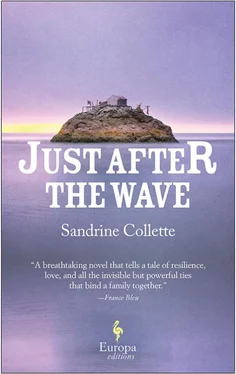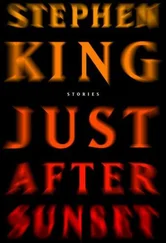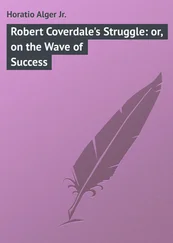They cannot take their eyes off the storm as they move along it, graze past it, helpless to get away or to stop the storm from taking them with it, should the currents change, but they don’t think of this, they’re too busy clutching the boat, bracing their legs, regaining their balance when they slip.
Not as strong.
It’s getting calmer , says Louie again, in a low voice.
Waves slapping on the ocean.
Yes, not as strong.
A tiny burst of joy in their thoughts. Is it over? asks Perrine.
Almost.
Five, ten minutes. No more black. Gray, blue, a little bronzed yellow, as if the sun were trying to break through, to rip open the thick clouds. A single ray of light, unexpected, incongruous, inscribes an arrow of light from the sky to the sea. The boat has stopped shaking them about.
Noah looks up. And that?
Then they see it.
Behind them, raised by the elements, a renewed onslaught of waterspouts.
* * *
Before their gaping eyes, the sea has risen again. A sort of nightmare starting over, a bad dream they cannot escape, toying with them, making them believe that—and then.
The boat gesticulates on the sea—that is really the word for it—it twists, distends, a wooden body cracking and contorting, slamming the surface of the water every time it comes down, hemmed in by a pellet spray of lightning all around the children. In the beginning they shouted advice, orders, questions; now there is only a long wailing when the sea buffets them, half capsizing the boat, which rights itself just in time, they can’t even bail the water that is gradually making it heavier, it’s all they can do to huddle down, cling on, stay on board. The tarp tore away immediately, they saw it fly off into the sky, whirling, descending, heading off again—then they didn’t see it again, the storm took it, it’s gone; they hold on.
A dozen times, rattled by a breaker, a wave, a dreadful trough, they thought they would let go. Did let go, a hand, a foot, they slipped, by some miracle the three of them are still all in the boat, with the hens, which roll from side to side, beating their wings. The only thing they can feel is that their strength is waning, that the storm will get the better of them, their arms are braced, their aching fingers can no longer close tight enough around the ropes, and sometimes their gazes meet, full of fear, then look away, trying to find some sort of support, a place to hold onto.
Suddenly the wave is there: the one they dreaded. Broadside, all at once. A terrible sound, as if the boat is being torn apart.
They roll over.
In a sort of a hiccup the boat rights itself then crashes into the trough of the wave, tearing the children’s hands from the ropes and the gunwale, sending them crashing against the bow. They cry, scream, no one hears. No one to help. They don’t even say to themselves that they are going to die. Words are silenced.
Don’t even look at one another.
Everyone for themselves; the world around has vanished. No more thoughts, nothing that is not straining fully toward those clinging hands, those curving fingers, all breath choked by showers of spray.
There is only fear.
And the howling of the wind on the sea, like the terrifying cry of a ghost looking for lost children, parting the walls of storm with great gusts and blasts of rage.
When the wave recedes, they slam together where they have been hurled to the bottom of the boat, their noses bleeding unnoticed, they scratch and graze each other, and the hens in turn lose their balance, slide out from under the seat where even their frenetic beating of wings cannot restrain them. The children hear their squawking and cackling as if from another world; a moment later, the hens come tumbling on top of them, lacerating them with their claws as they struggle to right themselves, wings spread, flapping, hindered by the storm. Several of them roll from one end of the boat to the other, and Louie knows, reaches out, too late—they are catapulted against them, bounce, are projected overboard, they can hear the furious squawking, a few seconds, then nothing more, the children huddle under the seats, terrified by the sea’s momentum and how it has taken their hens, nothing more, no, just Perrine’s scream.
“My eyes!”
But Louie and Noah don’t reply, they don’t understand, the storm has petrified them. Bruised from falling, colliding, they cling on, hopelessly, instinctively, it’s not anything they can control, their arms are paralyzed. Only Perrine is no longer holding on; her hands are pressed against her face.
But once again, they do not see.
Everyone for themselves.
Not out of selfishness: because they are terrified of death, it fills their minds, absorbs the last of their strength, their last breath.
Perrine is lying to one side.
And this time, the storm recedes.
* * *
Despite the rough waves Louie has crawled on his knees over to his sister, once her moans entered his panicked mind. Wading through the water that has swamped the boat, he shakes her; her hands are still held to her face.
“What is it?”
“The hens… they scratched my eyes with their legs… I can’t see, Louie, Louie I’m blind!”
She has long gashes of open flesh on her face, as if they had been made with a dull needle on which a great deal of pressure has been placed. There is blood everywhere; her eyelids are torn.
“It hurts, it hurts…”
“Take your hands away so I can see!”
But Perrine is protecting herself, doesn’t want to be touched; her cries are gut-wrenching to Louie and Noah, this never-ending pain they cannot ease. Louie pours some water on a cloth, cleans Perrine’s cheeks where she will let him touch her, her forehead, he braces himself against the seat not to slip, with the ongoing tremors, he encourages her in a quiet voice, Take your hands away, I have to clean it —and she cries, No, no, no!
Noah, holding the water bottle, cries out:
“You want me to make her?”
Louie shakes his head; his gestures jerky with the backwash and the waves, he gives up: he’ll only hurt her. He places the cold cloth over Perrine’s eyes.
“Just hold it like this, it’s cool, it’ll feel better.”
Her little fingers close around the cloth between two sobs. Louie stays by his sister for a few moments, then slips over to the edge to look out at the sea. Noah kneels beside him.
“She’s really unlucky, huh.”
“Uh-huh.”
“And she already lost one eye.”
“Yes.”
“You think we’re going to die today?”
“Leave me alone with your stupid questions!”
Noah withdraws into himself, goes back to Perrine, who is moaning.
“Does it hurt?”
She doesn’t answer. The boy nods.
“Yeah, me too when it hurts I don’t feel like talking.”
He sits cross-legged, takes her hand.
“You don’t have to say anything.”
And adds:
“I hope we won’t sink.”
Later, he’ll boast that it was only a little bitty storm—he’ll even say, because he’d heard his father use the expression, that they caught the tail end of the storm —and Louie will give a shrug:
“You don’t know what the hell you’re talking about. We were lucky, is all.”
Just as the rain stopped all of a sudden, the storm has subsided. Or did it go elsewhere? They don’t know, they know only that the boat is no longer pitching, that the wind is no longer howling, and that the sky, for the few remaining hours of daylight, is clearing. Louie bails with a bowl.
Murmurs: Incredible.
Yes, they were lucky.
Except Perrine.
The two boys sit around the girl. Noah raises his eyebrows.
Читать дальше












